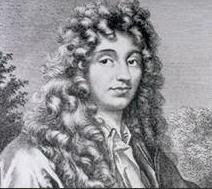 Huygens, Christiaan (1629-1695), Dutch astronomer, mathematician, and physicist, born in The Hague. His numerous, original scientific discoveries won him wide recognition and honors among scientists of the 17th century. Among his discoveries was the principle (later named after him) that states that every point on the front of an advancing wave is itself a source of new waves. From this principle he developed the wave theory of light. In 1655 he found a new method of grinding and polishing lenses. The sharper definitions obtained enabled him to discover a satellite of Saturn and to give the first accurate description of the rings of Saturn. The need for an exact measure of time for observing the heavens led to his applying the pendulum to regulate the movement of clocks. In 1656 he devised an eyepiece for the telescope that bears his name. In Horologium Oscillatorium (1673) he determined the true relation between the length of a pendulum and the period of oscillation and developed theories on centrifugal force in circular motion that assisted the English mathematician Sir Isaac Newton in formulating the laws of gravity. In 1678 he discovered the polarization of light by double refraction in calcite.
Huygens, Christiaan (1629-1695), Dutch astronomer, mathematician, and physicist, born in The Hague. His numerous, original scientific discoveries won him wide recognition and honors among scientists of the 17th century. Among his discoveries was the principle (later named after him) that states that every point on the front of an advancing wave is itself a source of new waves. From this principle he developed the wave theory of light. In 1655 he found a new method of grinding and polishing lenses. The sharper definitions obtained enabled him to discover a satellite of Saturn and to give the first accurate description of the rings of Saturn. The need for an exact measure of time for observing the heavens led to his applying the pendulum to regulate the movement of clocks. In 1656 he devised an eyepiece for the telescope that bears his name. In Horologium Oscillatorium (1673) he determined the true relation between the length of a pendulum and the period of oscillation and developed theories on centrifugal force in circular motion that assisted the English mathematician Sir Isaac Newton in formulating the laws of gravity. In 1678 he discovered the polarization of light by double refraction in calcite.Encyclopedia Blog For Kid's Research In Sciences, Health, Environment and Technology
Huygens, Christiaan
 Huygens, Christiaan (1629-1695), Dutch astronomer, mathematician, and physicist, born in The Hague. His numerous, original scientific discoveries won him wide recognition and honors among scientists of the 17th century. Among his discoveries was the principle (later named after him) that states that every point on the front of an advancing wave is itself a source of new waves. From this principle he developed the wave theory of light. In 1655 he found a new method of grinding and polishing lenses. The sharper definitions obtained enabled him to discover a satellite of Saturn and to give the first accurate description of the rings of Saturn. The need for an exact measure of time for observing the heavens led to his applying the pendulum to regulate the movement of clocks. In 1656 he devised an eyepiece for the telescope that bears his name. In Horologium Oscillatorium (1673) he determined the true relation between the length of a pendulum and the period of oscillation and developed theories on centrifugal force in circular motion that assisted the English mathematician Sir Isaac Newton in formulating the laws of gravity. In 1678 he discovered the polarization of light by double refraction in calcite.
Huygens, Christiaan (1629-1695), Dutch astronomer, mathematician, and physicist, born in The Hague. His numerous, original scientific discoveries won him wide recognition and honors among scientists of the 17th century. Among his discoveries was the principle (later named after him) that states that every point on the front of an advancing wave is itself a source of new waves. From this principle he developed the wave theory of light. In 1655 he found a new method of grinding and polishing lenses. The sharper definitions obtained enabled him to discover a satellite of Saturn and to give the first accurate description of the rings of Saturn. The need for an exact measure of time for observing the heavens led to his applying the pendulum to regulate the movement of clocks. In 1656 he devised an eyepiece for the telescope that bears his name. In Horologium Oscillatorium (1673) he determined the true relation between the length of a pendulum and the period of oscillation and developed theories on centrifugal force in circular motion that assisted the English mathematician Sir Isaac Newton in formulating the laws of gravity. In 1678 he discovered the polarization of light by double refraction in calcite.-
A stamp depicting the image of Hanaoka Seishu. Hanaoka Seishu (1760-1835), Japanese physician and pioneer of anesthetic surgery. Hanaok...
-
In the N and W United States the era of mechanized agriculture began with the invention of such farm machines as the reaper, the cultivator,...
-
Fluid Mechanics, physical science dealing with the action of fluids at rest or in motion, and with applications and devices in engineering u...
